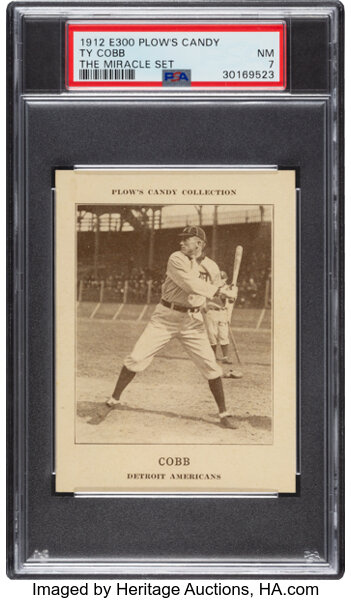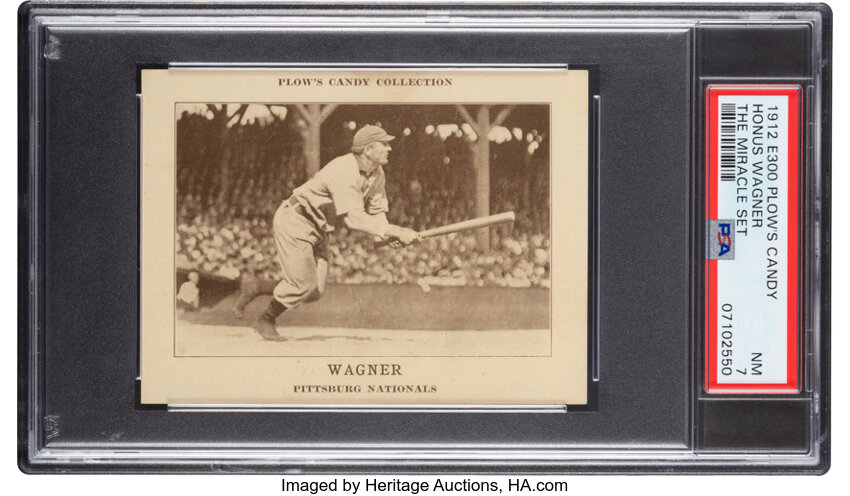Every baseball card collector and sports collectibles investor knows that the T206 Honus Wagner card from 1909 is the most valuable sports card ever sold to date. There is true scarcity with maybe 60 or so examples surviving. There is also major demand as the sale price may not ever be under $1 million again outside of the most mangled examples. But try this on for serious scarcity for two cards — The 1912 E300 Plow’s Candy Honus Wagner and the 1912 E300 Plow’s Candy Ty Cobb!
Heritage Auctions has these two cards from the ultra-rare 1912 E300 Plow’s Candy set up for auction. With almost two weeks to go, the prices are already in the stratosphere. This set is so rare that many collectors have never even seen nor heard of the cards.
According to Heritage Auctions view on just how scarce these cards are, not even Jefferson Burdick, who authored the crucial book The American Card Catalog, knew this set existed upon his passing in 1963. The PSA CardFacts site notes that the Plow’s Candy set says it is considered difficult, if not impossible, to assemble a complete set.
The 1912 E300 Plow’s Candy set is dated 1912 but was sold in 1913 as premium with chocolate. As for the company and the cards, Plow’s Candy Company was founded in Chicago in 1885 and this set would come to be called The Miracle Set. There are only around 200 of the entire E300 cards which likely exist. The graded population is only about 175 cards. Heritage and the collectibles industry are not even sure how many cards may have been in this card set.
The press release cited Standard Catalog of Baseball Cards listing 69 cards in the E300 Plow’s Candy Collection. It then goes on to say that it remains unclear today how many cards would be needed to count as a complete set. The edition of the Sports Collectors Bible published in 1977 had indicated that there were only 34 known players in the Plow’s Candy Collection set. Honus Wagner’s card had not yet been discovered at that time.
It is amazing that these ultra-rare 3″ by 4″ cards with a gold-tone sepia images have survived in this condition. The golden images are in-action with both great hitters at bat. Most of these cards would have been stored in an album or in a book some 110 years ago.
Only 9 of the Ty Cobb cards are known to exist in the joint populations between PSA and SGC, with the PSA population report showing just 8. This particular Ty Cobb is graded as a PSA 7 (image below by Heritage Auctions), but Heritage pointed out that a VG-EX+ 4.5 specimen changed hands a year and a half ago just short of $900,000. Heritage went on to say that it would surely hit the 7-digit pricing if it were to take another turn on the block today.
Well, then what will a PSA 7 fetch? The guide value or estimates was put at “$300,000 – up” but the current bid of $150,000 is actually a $180,000 bid after the buyer’s premium and that is with 13 days remaining in the bidding.

As for the 1912 E300 Honus Wagner, this example is listed as both the highest-graded example and the only known example to exist (image below by Heritage Auctions). That puts its scarcity far higher than the T206, and the PSA 7 is better than the graded T206 Wagners that usually come to auction in poor condition.
Heritage’s Guide value or estimate is also “$300,000 – up” but the current bid of $115,000 represents $138,000 after the buyer’s premium also with 13 days remaining.

We wanted to get an idea for other sales. According to PSA, a PSA 7 Honus Wagner sold on 8/11/2006 for $40,825.00 through Memory Lane. That is the same PSA certification, so it is the same card up for grabs now. PSA shows 4 of the E300 Ty Cobb sales that it has recognized in the past 20 years:
- 12/8/2018 PSA 4 for $40,507.50 via Goldin Auctions
- 3/31/2017 PSA 4 for $29,110.80 via Goodwin and Co. Auctions
- 4/15/2015 PSA 5 for $36,000.00 via Robert Edward Auctions
- 8/11/2006 PSA 6 for $23,552.00 via Memory Lane, Inc.
Heritage gave a detailed description of how Gary Dean Simpson acquired the cards in the town Mineral Wells, Texas years ago through an antique shop owner. Simpson is said to have enlisted researchers in Chicago and St. Louis to do some background work and he gave a detailed description of Plow’s owner and of the doomed company’s history. Edward Plows was a New York native who moved to Chicago in the early 1870s and became involved with Chicago’s elite. That report said:
He was a mercurial, mysterious and “bombastic” figure, Simpson says, disappearing for long stretches of time (due to “marital affairs and financial shenanigans,” Simpson says) yet still present enough to create candy parlors more like palaces for Chicago socialites.
By 1904 Plows was sponsoring the World’s Fair in St. Louis, where he opened a candy factory and store in 1890. But Edward Plows only lived until 1906, dying at the age of 51 due to illness. The business fell to his wife, Sallie, who oversaw operations in Chicago and St. Louis (by then, home of the flagship) and helped the company turn a modest profit until bankruptcy came for the chocolatier in 1912.
Simpson also discovered how much the cards cost to make, which may also indicate that the company’s premium products may have been too selective or too above-market. The cards were shown to cost $0.52 to make back then and the box of chocolates sold by Plow’s cost only $0.05 at the time. That means these inserts were essentially the so-called “Golden Ticket” cards of that time. Heritage also noted that these were no common playthings jammed into product boxes — rather high-quality premiums hand-delivered to the affluent Plows clientele.
Some scarce items seem to go above and beyond in the scarcity department. What happens when the scarcity is featured this deeply with names like Ty Cobb and Honus Wagner is up to you to imagine, but the end results is that these cards look like they are about to shatter new records in the department of scarce cards.


